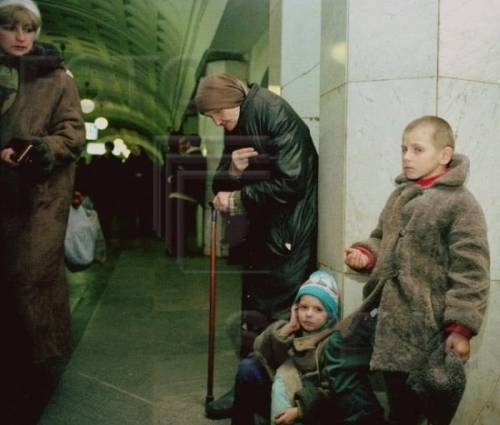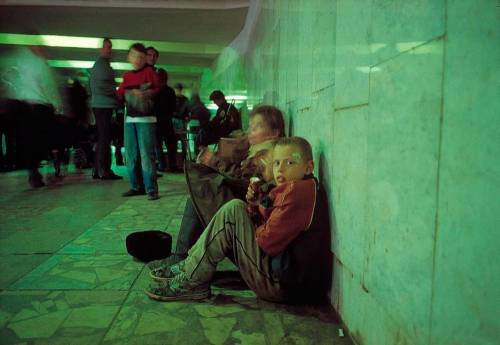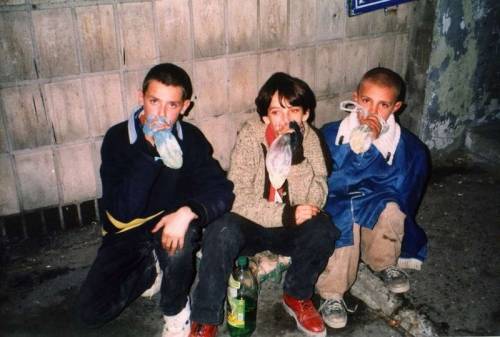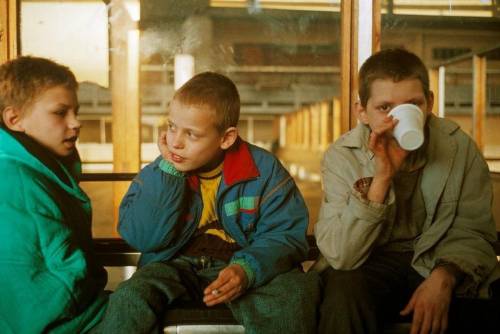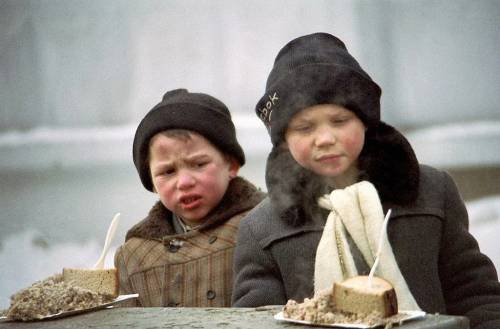#proletariat
Starving and homeless children in Russia in the 1990s, who often became victims of substance abuse, sexual abuse and were actively involved in crime. These scary photos are reminders that the West considers Russia in the 90s “democratic, free and detached from totalitarian communism.”
The capitalism implementation in Russia during the 90’ was probably the biggest capitalism failure of all times. Yeltsin implemented the economic policies applauded by the neoliberal institutions (FMI, World Bank, etc.) With mass privatisations, welfare destruction, destatalisation, destruction of social rights etc. The results were terrifying from all point of views:
As always happens in capitalism there were cartels, trusts etc. That formed a class of oligarchs that put themselves above the State leading the policies towards their interest against the interest of the people. Mostly represented by the Semibankirschina.
-Dramatically drop of life expectancy arriving at 7 years drop in less then a decade for men.
-Dramatic rise in mortality.
-Dramatic rise in self destructive behaviours like drugs and alcohol abuse.
-Mass depression
-Low birth rates due to financial instability and uncertainty
-crime rates rise with entire pieces of the country controlled by organised crime
-Moral crisis well represented by the dramatic increase of prostitution ( Prostitution that was de facto absent during most of Soviet times especially under Stalin but that started again with Gorbachev)
-The debt default of 1998.
Post link
E é por isso que eu aceito os meus de muito bom grado. Não sou dono do desejo de minha amada, nem preciso recorrer à musica sertaneja comercial para aliviar um dor que eu nunca terei. Corno e orgulhoso de sê-lo.
Post link
today is may day, may 1st, labor day, international workers day, proletariat day…
however you call it, today we remember our comrades who fought (& are still fighting) for a world where wealth and power is evenly distributed.
today we also celebrate our successes: unions,workersrights,40 hour work week (should be 24 max but we’ll work on that ☺️) abolishing child labor etc
there’s still so much to fight for, that’s why today i marched with my union-, climate activists-, and socialist comrades!



The state is, fundamentally, an organisation of force.
It exists because there are unequal social classes. It is used by the capitalist class to suppress workers, through protecting the means of production as the private property of capitalists.
The means of production are factories, plants, facilities, machines, and so on.
The state is used by working people to take ownership of the economy, so that the economy belongs to the people who operate it.
It does not mean persecuting workers who are self-employed.
Social ownership of production means that everyone in society has equal relations to property. This eliminates economic inequality and abolishes social class.
Without social class, there is no group to oppress, and so the state, without a function, does not function at all. The conditions that gave birth to the state would have been ended.
A stateless and classless society is referred to as ‘socialism’ or ‘communism’.
The working class, or proletariat, are waged employees. They rely on this wage to survive.
They are hired to make money (surpluses) for their employers. In order to keep a job, workers must create more wealth than they receive in wages.
Employers collect these surpluses. Everything left after wages are paid is profit. Employers therefore receive more wealth than they create.

How profit is created and distributed (simplified).
Under capitalism, the wealth dynamic resembles that of older economic systems - lord and serf, or master and slave.
In each instance, those who work create surpluses, and in turn may receive enough to survive, but not enough to escape reliance on the exploiter.
The use of ‘exploiter’ is not moralistic. Under capitalism, individuals must be one or the other - employer or employee, exploiter or exploited. The relationship is systemic.
Wage competition between workers forces wages down.
When workers cannot live on the wage, the capitalist state subsidises the employer through welfare schemes.
If workers could not live, the market would collapse.

